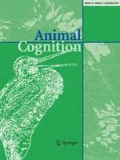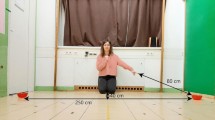Abstract
Dogs are known to consistently follow human pointing gestures. In this study, we asked whether dogs “automatically” do this or whether they flexibly adjust their behavior depending upon the reliability of the pointer, demonstrated in an immediately preceding event. We tested pet dogs in a version of the object choice task in which a piece of food was hidden in one of the two containers. In Experiment 1, Phase 1, an experimenter pointed at the baited container; the second container was empty. In Phase 2, after showing the contents of both containers to the dogs, the experimenter pointed at the empty container. In Phase 3, the procedure was exactly as in Phase 1. We compared the dogs’ responses to the experimenter’s pointing gestures in Phases 1 and 3. Most dogs followed pointing in Phase 1, but many fewer did so in Phase 3. In Experiment 2, dogs followed a new experimenter’s pointing in Phase 3 following replication of procedures of Phases 1 and 2 in Experiment 1. This ruled out the possibility that dogs simply lost motivation to participate in the task in later phases. These results suggest that not only dogs are highly skilled at understanding human pointing gestures, but also they make inferences about the reliability of a human who presents cues and consequently modify their behavior flexibly depending on the inference.


Similar content being viewed by others
References
Adachi I, Kuwahata H, Fujita K (2007) Dogs recall their owner’s face upon hearing the owner’s voice. Anim Cogn 10:17–21
Behne T, Liszkowski U, Carpenter M, Tomasello M (2012) Twelve-month-olds’ comprehension and production of pointing. Br J Dev Psychol 30:359–375
Bräuer J, Kaminski J, Riedel J, Call J, Tomasello M (2006) Making inferences about the location of hidden food: social dog, causal ape. J Comp Psychol 120:38–47
Chow V, Poulin-Dubois D, Lewis J (2008) To see or not to see: infants prefer to follow the gaze of a reliable looker. Dev Sci 11:761–770
Corriveau K, Harris PL (2009) Choosing your informant: weighing familiarity and recent accuracy. Dev Sci 12:426–437
Couillard NL, Woodward AL (1999) Children’s comprehension of deceptive points. Br J Dev Psychol 17:515–521
Fujita K, Morisaki A, Takaoka A, Maeda T, Hori Y (2012) Incidental memory in dogs (Canis familiaris): adaptive behavioral solution at an unexpected memory test. Anim Cogn 15:1055–1063
Gácsi M, Kara E, Belényi B, Topál J, Miklósi A (2009) The effect of development and individual differences in pointing comprehension of dogs. Anim Cogn 123:471–479
Hare B, Tomasello M (1999) Domestic dogs (Canis familiaris) use human and conspecific social cues to locate hidden food. J Comp Psychol 113:173–177
Hare B, Tomasello M (2005) Human-like social skills in dogs? Trends Cogn Sci 9:439–444
Hare B, Brown M, Williamson C, Tomasello M (2002) The domestication of social cognition in dogs. Science 298:1634–1636
Harris PL, Corriveau KH (2011) Young children’s selective trust in informants. Phil Trans R Soc Lond B Biol Sci 366:1179–1187
Heyman G, Sritanyaratana L, Vanderbilt KE (2013) Young children’s trust in overtly misleading advice. Cogn Sci 37:646–667
Itakura S, Tanaka M (1998) Use of experimenter given cues during object choice tasks by chimpanzees (Pan troglodytes), an orangutan (Pongo pygmaeus), and human infants (Homo sapiens). J Comp Psychol 112:119–126
Koenig MA, Clément F, Harris PL (2004) Trust in testimony: children’s use of true and false statements. Psychol Sci 15:694–698
Kundey SM, Reyes ADL, Arbuthnot J, Allen R, Coshun A, Moline S, Royer E (2010) Domesticated dogs’ (Canis familiaris) response to dishonest human points. Int J Comp Psychol 23:201–215
Kundey SMA, Reyes ADL, Royer E, Molina S, Monnier B, German R, Coshun A (2011) Reputation-like inference in domestic dogs (Canis familiaris). Anim Cogn 14:291–302
Lakatos G, Soproni K, Dóka A, Miklósi Á (2009) A comparative approach to dogs’ (Canis familiaris) and human infants’ comprehension of various forms of pointing gestures. Anim Cogn 12:621–631
Marshall-Pescini S, Passalacqua C, Ferrario A, Valsecchi P, Prato-Previde E (2011a) Social eavesdropping in the domestic dog. Anim Behav 81:1177–1183
Marshall-Pescini S, Prato-Previde E, Valsecchi P (2011b) Are dogs (Canis familiaris) misled more by their owners than by strangers in a food choice task? Anim Cogn 14:137–142
Miklósi Á, Polgárdi R, Topál J, Csányi V (1998) Use of experimenter-given cue in dogs. Anim Cogn 1:113–121
Miklósi Á, Kubinyi E, Topál J, Gácsi M, Virányi Z, Csányi V (2003) A simple reason for a big difference: wolves do not look back at human, but dogs do. Curr Biol 13:763–766
Nitzschner M, Melis AP, Kaminski J, Tomasello M (2012) Dogs (Canis familiaris) evaluate humans on the basis of direct experiences only. PLoS ONE 7:e46880
Petter M, Musolino E, Roberts W, Cole M (2009) Can dogs (Canis familiaris) detect human deception? Behav Process 82:109–118
Prato-Previde E, Marshall-Pescini S, Valsecchi P (2008) Is your choice my choice? The owners’ effect on pet dogs’ (Canis lupus familiaris) performance in a food choice task. Anim Cogn 11:167–174
Reid P (2009) Adapting to the human world: dogs’ responsiveness to our social cues. Behav Process 80:325–333
Riedel J, Schumann K, Kaminski J, Call J, Tomasello M (2008) The early ontogeny of human–dog communication. Anim Behav 75:1003–1014
Szetei V, Miklósi Á, Topál J, Csányi V (2003) When dogs seem to lose their nose: an investigation on the use of visual and olfactory cues in communicative context between dog and owner. Appl Anim Behav Sci 83:141–152
Takaoka A (2009) Social intelligence in dogs viewed from dog-human interaction. Jpn J Anim Psychol 59:15–23
Takaoka A, Morisaki A, Fujita K (2013) Cross-modal concept of human gender in dogs (Canis familiaris). Jpn J Anim Psychol 63:123–130
Udell MR, Wynne CDL (2008) A review of domestic Dogs’ (Canis familiaris) human-like behaviors: or why behavior analysts should stop worrying and love their dogs. J Exp Anal Behav 89(2):247–261
Vanderbilt K, Liu D, Heyman G (2011) The development of distrust. Child Dev 82:1372–1380
Acknowledgments
This study was supported by Grant-in-for JSPS Research Fellows No. 225877 to Akiko Takaoka, Grant-in-Aid for Scientific Research Nos. 2022004 and 25240020 to Kazuo Fujita, and MEXT Global COE program, D-07 to Kyoto University. All of the experiments were conducted after collecting informed consent from the dogs’ owners. We thank all of the dogs and dog owners who volunteered for this study. We also wish to thank James R. Anderson for his valuable comments. We also thank Sho Otaki for his help in the statistical analyses. We also thank the anonymous reviewers for their helpful comments on an earlier version of this manuscript.
Conflict of interest
We declare no conflict of interest regarding this study.
Author information
Authors and Affiliations
Corresponding author
Rights and permissions
About this article
Cite this article
Takaoka, A., Maeda, T., Hori, Y. et al. Do dogs follow behavioral cues from an unreliable human?. Anim Cogn 18, 475–483 (2015). https://doi.org/10.1007/s10071-014-0816-2
Received:
Revised:
Accepted:
Published:
Issue Date:
DOI: https://doi.org/10.1007/s10071-014-0816-2




